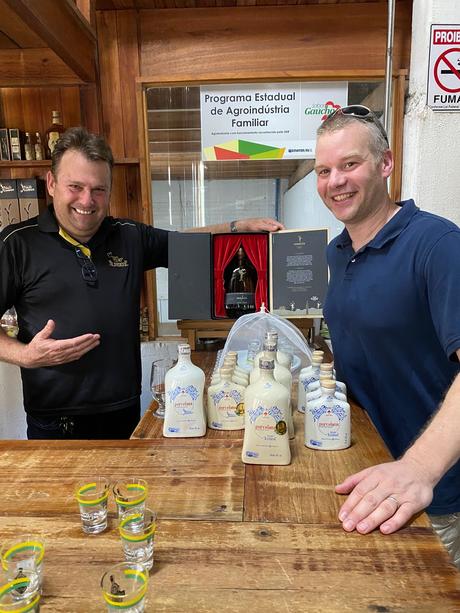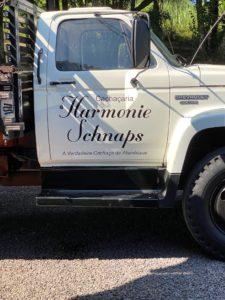 On Friday morning, I headed to Harmonie Schnapps. I'd set up this visit before I'd left Brasilia and was excited to visit a distillery that had received so much praise from members of the cachaça community.
On Friday morning, I headed to Harmonie Schnapps. I'd set up this visit before I'd left Brasilia and was excited to visit a distillery that had received so much praise from members of the cachaça community.
Harmony, was a short, pleasant drive from Nova Petropolis. I left the clogged main roads and found myself on tranquil, well-maintained thoroughfares. Google hadn't steered me wrong yet, and a little before 9:30 am, I saw that I was but a few moments away from my destination.
The final turn was a right, according to the directions. But the right it told me to take was an weed-covered driveway. From the road, I could see a poorly kept house. Instead of turning in, I drove on. Of course, the directions told me that I needed to turn around and make that damned turn.
So that's what I did. I drove slowly down the dirt driveway, which I realized was actually a crappy road, which curved past the house and led me deep into farmland. On my left and right, sugarcane grew, the green stalks about half the height they would be when harvested. The fields parted and ahead of me, to the right, cows grazed on an open field.
According to Google Maps, my destination was only a few hundred meters away. And, indeed, the directions hadn't steered me wrong.
Harmonie Schnapps stood close to the road, a truck parked outside with its emblem emblazoned on it. It was warm that day, though it was early. Inside the store area was silent. From behind a door, in front of me, I heard movement. A pair of eyes spied me and gave me a signal to wait just a moment.
Leandro Hilgert greeted me, a wide smile on his face. The founder of Harmonie Schnapps was about my age and I noticed immediately just how passionate he was about his profession. There was a history to Harmonie Schnapps, but somewhat different than the other distilleries I'd visited before.
Leandro's grandparents had distilled cachaça. I don't remember discussing the subject, but my assumption was that they had done so clandestinely. His father hadn't continued the tradition, and therefore, he hadn't grown up close its production.
In the early 2000s, Leandro was a mechanic for Renault, working in a nearby city. He'd been working there since he was 13 years old and didn't really imagine doing anything else as a full-time career. It wasn't until his cousin mentioned the possibility of distilling cachaça that he'd even considered it.
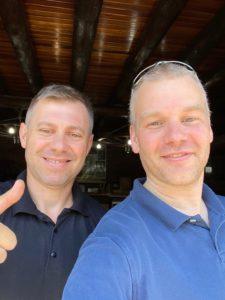
Leandro, his wife, and young daughter live just above the distillery. He works a lot, but said that he wouldn't do anything differently. They love what they do and they enjoy working together. They've even set up a lounge area for themselves, which is reminiscent of a man cave.
I sampled a bit of product, though I had purchased a bottle or two of their cachaça previously, and ended up buying a bottle of their famous Amburana.
I'd been there for a couple of hours and Leandro had been generous enough to spend a great deal of time with me, but I had another appointment to get to nearly two hours away. Plus, I had to eat some lunch or I would die of hunger. So, I thanked Leandro and his team for their hospitality and got on my way, this time heading in a different direction from whence I'd come, putting me closer to the road.
I'd made it nearly to Bento Gonçalves when I realized how hungry I was. I stopped immediately at the first place I could, which happened to be good Italian restaurant, where I got the price fixed menu, which was 48 reais and included soup, salad, pasta, chicken, and dessert. I didn't think I could have made a better choice.
When I was done, I got back on the road because I had another 45 minutes of driving ahead of me. On the route I took, it was clear that this was wine country. Rio Grande do Sul is one of the, if not the, biggest producers of wine in Brazil. No, Brazil is not particularly well known for its wine. But in recent years, the quality of the products has improved tremendously, and it was clear from my drive that they expected vineyards to be a large tourist draw. At least two were building large, luxury hotels in very remote areas.
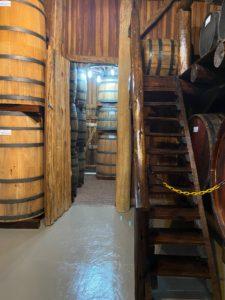
Like my trip earlier in the day, the GPS told me to take an odd turn. I found myself crossing railroad tracks and going up a wooded hill that was quite possibly not a road.
I was not in the right place. Rather, as previously, I'd misread what the GPS was telling me to do.
Velho Alambique was about two hundred meters from where I was, and when I finally figured that out, I got myself headed in the right direction.
Velho Alambique, or Old Distillery, was much as the name described. There was a house in front and an older production area in back, neither of which, from the appearance of those buildings, looked like they'd gotten much attention in the recent past.
When I stepped out of the car, the heat kicked me in the face. And when I walked through the front door of Velho Alambique, I got little relief. Ivandro Remus greeted me, sweating profusely, with a great smile. Ivandro, like Leandro, his good friend from Harmonie, started his cachaça business in an unusual way. He was born and raised nearby Santa Tereza, and worked in his father's grocery store. He'd always wanted to be an entrepreneur. One day, during the rainy season, he'd found himself nearby the current location of Velho Alambique, watching the nearby river as it crested. He noticed an older man nearby and got to talking with him. This gentleman was a cachaça producer and had been in business, clandestinely, for some time.
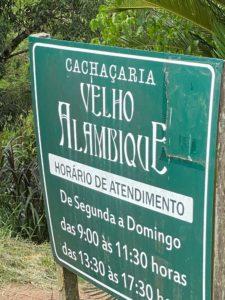
Producing about 70,000 liters per year, Velho Alambique also continues on an upward curve. Ivandro and his wife are building a new facility just next to the hill which I almost drove up, not more than a few hundred meters away. We were standing outside overlooking the rolling, green hills, to the site where they would soon construct a new production facility, when Ivandro's wife came and told us that it was 45 degrees outside. And remember, when I say 45 degrees, that's Celsius. In Fahrenheit, that's 113 degrees. It was hot AF.
And what better thing to do when it's hot outside than to go in and sample some good cachaça. Ivandro told me about his relationship with Leandro as I sampled, about their travels to Rio de Janeiro to sell their wares together, and that time they tried to evade a gang of marauding car jackers. Ivandro and Leandro reminded me, in some sense of the odd couple, in that they clearly had very different approaches to their operations. But they liked one another a great deal and relied on each other as a system of support. It was something that I hadn't expected.
It was late afternoon when I left Ivandro, promising to keep in touch. And when I hit the outside, the heat stunned me. I got in the car as fast as I could and made my way back on to the road, blasting the air conditioning. I had a two-hour drive ahead of me. I was surprised when the GPS asked me to turn off the main road and on to a dirt lane that led me directly up a mountain. I felt relaxed and good about the directions that the GPS had given me before. And though I could only go about ten miles per hour up and then down, bumping along the unpaved road, it wasn't that bad of a drive, and offered scenic views that I wouldn't have otherwise gotten. It also didn't take me any longer to get back to Nova Petropolis. And by the time I realized I wasn't totally lost, I was a stone's throw of my home base. It had been quite a day. What's more, I had to wake up early the next day to get to the next phase of my trip.
I felt like I'd done so much already, and I wasn't even halfway through.
